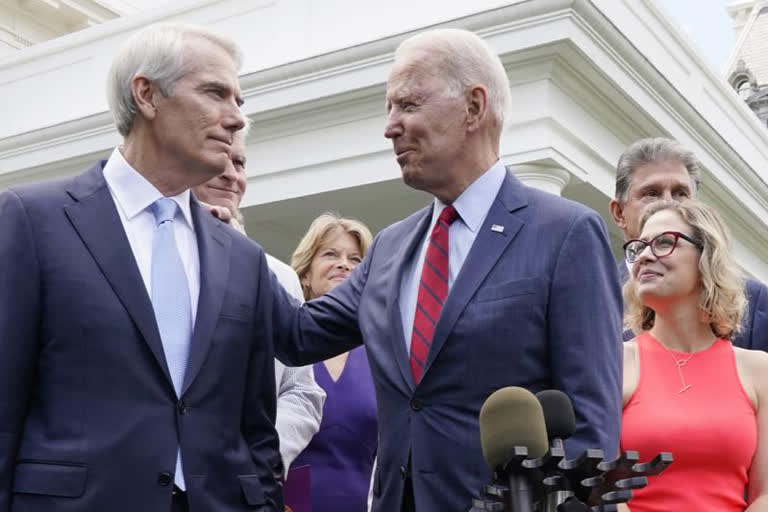Washington (US):A bipartisan deal to invest nearly $1 trillion in the nation’s infrastructure appeared to be back on track Sunday after a stark walk-back by President Joe Biden to his earlier insistence that the bill is coupled with an even larger Democrat-backed measure in order to earn his signature.
Republican senators who brokered the agreement with the White House and Democrats to fund badly needed investments in roads, bridges, water and broadband internet indicated they were satisfied with Biden’s comments that he was dropping the both-or-nothing approach. In a statement issued Saturday after 48 hours of behind-the-scenes manoeuvring by the White House to salvage the deal, Biden said it was not his “intent” to suggest he was issuing a veto threat on the bill.
That proved to be enough for some wavering Republicans, who have privately and not-so-privately registered their displeasure at the linkage.
“Over the weeks and weeks in negotiations with Democrats and with the White House on an infrastructure bill, the president’s other agenda was never linked to the infrastructure effort,” Utah Republican Sen. Mitt Romney said on CNN’s “State of the Union” on Sunday. He said that if Biden had not put out the statement, “I think it would have been very, very hard for Republicans to say, yes, we support this.” “We’re not going to sign up for a multitrillion-dollar spending spree,” he added, referencing the larger Democratic bill.
Read: US withdrawal from Afghanistan can have consequences for both sides: Ghani to Biden
Romney said he believed there was now sufficient GOP support in the Senate to reach the 60-vote threshold to overcome a potential filibuster and pass the bipartisan package. Another GOP negotiator, Sen. Bill Cassidy of Louisiana, even predicted that Senate Minority Leader Mitch McConnell, who has staked out a path back to the majority relying in large part on stiff opposition to the Biden agenda, would even support the final bill.
“If we can pull this off, I think Mitch will favour it,” he said on NBC’s “Meet the Press.” “I think Leader McConnell will be for it, if it continues to come together as it is.”
Montana Sen. Jon Tester, a Democrat, predicted the measure would draw more than the minimum 10 Republican senators needed to pass the bipartisan accord in the 50-50 Senate, where 60 votes are required to advance most bills, but he said there would likely be “bumps in the road” along the way. “We’ll work those problems,” he said on CBS News’ “Face The Nation.” “I think we’ll get far more than 60 votes.”
The bipartisan accord has been a key priority for Biden as he tries to deliver on a campaign promise to restore bipartisan cooperation to Washington and to show centrist Democrats and others that the White House was working with Republicans before Biden tries to push the broader package through Congress.
The two measures were always expected to move together through Congress: the bipartisan plan and a second bill that would advance under special rules allowing for passage solely with majority Democrats’ votes and is now swelling to as much as $6 trillion. Biden reiterated that was his plan on Saturday but said he was not conditioning one on the other.
